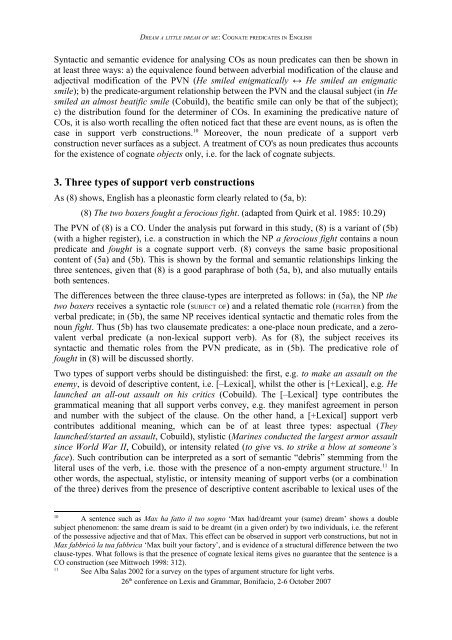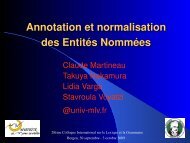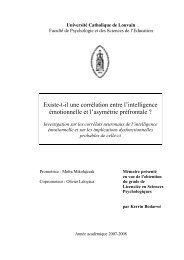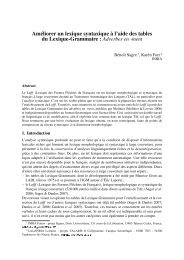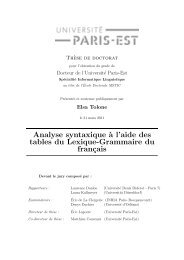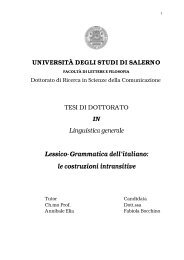Dream a little dream of me: Cognate Predicates in English
Dream a little dream of me: Cognate Predicates in English
Dream a little dream of me: Cognate Predicates in English
You also want an ePaper? Increase the reach of your titles
YUMPU automatically turns print PDFs into web optimized ePapers that Google loves.
DREAM A LITTLE DREAM OF ME: COGNATE PREDICATES IN ENGLISH<br />
Syntactic and semantic evidence for analys<strong>in</strong>g COs as noun predicates can then be shown <strong>in</strong><br />
at least three ways: a) the equivalence found between adverbial modification <strong>of</strong> the clause and<br />
adjectival modification <strong>of</strong> the PVN (He smiled enigmatically ↔ He smiled an enigmatic<br />
smile); b) the predicate-argu<strong>me</strong>nt relationship between the PVN and the clausal subject (<strong>in</strong> He<br />
smiled an almost beatific smile (Cobuild), the beatific smile can only be that <strong>of</strong> the subject);<br />
c) the distribution found for the determ<strong>in</strong>er <strong>of</strong> COs. In exam<strong>in</strong><strong>in</strong>g the predicative nature <strong>of</strong><br />
COs, it is also worth recall<strong>in</strong>g the <strong>of</strong>ten noticed fact that these are event nouns, as is <strong>of</strong>ten the<br />
case <strong>in</strong> support verb constructions. 10 Moreover, the noun predicate <strong>of</strong> a support verb<br />
construction never surfaces as a subject. A treat<strong>me</strong>nt <strong>of</strong> CO's as noun predicates thus accounts<br />
for the existence <strong>of</strong> cognate objects only, i.e. for the lack <strong>of</strong> cognate subjects.<br />
3. Three types <strong>of</strong> support verb constructions<br />
As (8) shows, <strong>English</strong> has a pleonastic form clearly related to (5a, b):<br />
(8) The two boxers fought a ferocious fight. (adapted from Quirk et al. 1985: 10.29)<br />
The PVN <strong>of</strong> (8) is a CO. Under the analysis put forward <strong>in</strong> this study, (8) is a variant <strong>of</strong> (5b)<br />
(with a higher register), i.e. a construction <strong>in</strong> which the NP a ferocious fight conta<strong>in</strong>s a noun<br />
predicate and fought is a cognate support verb. (8) conveys the sa<strong>me</strong> basic propositional<br />
content <strong>of</strong> (5a) and (5b). This is shown by the formal and semantic relationships l<strong>in</strong>k<strong>in</strong>g the<br />
three sentences, given that (8) is a good paraphrase <strong>of</strong> both (5a, b), and also mutually entails<br />
both sentences.<br />
The differences between the three clause-types are <strong>in</strong>terpreted as follows: <strong>in</strong> (5a), the NP the<br />
two boxers receives a syntactic role (SUBJECT OF) and a related thematic role (FIGHTER) from the<br />
verbal predicate; <strong>in</strong> (5b), the sa<strong>me</strong> NP receives identical syntactic and thematic roles from the<br />
noun fight. Thus (5b) has two clausemate predicates: a one-place noun predicate, and a zerovalent<br />
verbal predicate (a non-lexical support verb). As for (8), the subject receives its<br />
syntactic and thematic roles from the PVN predicate, as <strong>in</strong> (5b). The predicative role <strong>of</strong><br />
fought <strong>in</strong> (8) will be discussed shortly.<br />
Two types <strong>of</strong> support verbs should be dist<strong>in</strong>guished: the first, e.g. to make an assault on the<br />
enemy, is devoid <strong>of</strong> descriptive content, i.e. [–Lexical], whilst the other is [+Lexical], e.g. He<br />
launched an all-out assault on his critics (Cobuild). The [–Lexical] type contributes the<br />
grammatical <strong>me</strong>an<strong>in</strong>g that all support verbs convey, e.g. they manifest agree<strong>me</strong>nt <strong>in</strong> person<br />
and number with the subject <strong>of</strong> the clause. On the other hand, a [+Lexical] support verb<br />
contributes additional <strong>me</strong>an<strong>in</strong>g, which can be <strong>of</strong> at least three types: aspectual (They<br />
launched/started an assault, Cobuild), stylistic (Mar<strong>in</strong>es conducted the largest armor assault<br />
s<strong>in</strong>ce World War II, Cobuild), or <strong>in</strong>tensity related (to give vs. to strike a blow at so<strong>me</strong>one’s<br />
face). Such contribution can be <strong>in</strong>terpreted as a sort <strong>of</strong> semantic “debris” stemm<strong>in</strong>g from the<br />
literal uses <strong>of</strong> the verb, i.e. those with the presence <strong>of</strong> a non-empty argu<strong>me</strong>nt structure. 11 In<br />
other words, the aspectual, stylistic, or <strong>in</strong>tensity <strong>me</strong>an<strong>in</strong>g <strong>of</strong> support verbs (or a comb<strong>in</strong>ation<br />
<strong>of</strong> the three) derives from the presence <strong>of</strong> descriptive content ascribable to lexical uses <strong>of</strong> the<br />
10 A sentence such as Max ha fatto il tuo sogno ‘Max had/<strong>dream</strong>t your (sa<strong>me</strong>) <strong>dream</strong>’ shows a double<br />
subject pheno<strong>me</strong>non: the sa<strong>me</strong> <strong>dream</strong> is said to be <strong>dream</strong>t (<strong>in</strong> a given order) by two <strong>in</strong>dividuals, i.e. the referent<br />
<strong>of</strong> the possessive adjective and that <strong>of</strong> Max. This effect can be observed <strong>in</strong> support verb constructions, but not <strong>in</strong><br />
Max fabbricò la tua fabbrica ‘Max built your factory’, and is evidence <strong>of</strong> a structural difference between the two<br />
clause-types. What follows is that the presence <strong>of</strong> cognate lexical items gives no guarantee that the sentence is a<br />
CO construction (see Mittwoch 1998: 312).<br />
11 See Alba Salas 2002 for a survey on the types <strong>of</strong> argu<strong>me</strong>nt structure for light verbs.<br />
26 th conference on Lexis and Grammar, Bonifacio, 2-6 October 2007


